Bobby
Bare

-
Inducted2013
-
Born
April 7, 1935
-
Birthplace
Ironton, Ohio
Bobby Bare is one of country music’s greatest song interpreters. He championed up-and-coming songwriters including Tom T. Hall, Kris Kristofferson, and Shel Silverstein, bringing their songs to vivid life, and he helped kick-start the Outlaw era of the 1970s by serving as producer on his own recordings, gaining creative control that had not yet been afforded to other artists.
Upbringing and Early Career
Bare was born Robert Joseph Bare in Ironton, Ohio, near the West Virginia and Kentucky borders. His childhood was difficult, marked by poverty and by the death of his mother when Bare was five years old. He sought escape through music, and in 1953, he moved to Los Angeles, where he recorded briefly for the Capitol and Challenge labels in the mid-1950s and signed as a writer with Opal Music.
Bare had recently been drafted into the army when he recorded a demo of his song “All American Boy” for friend Bill Parsons, who was hoping to land a record deal. Cincinnati’s Fraternity Records released Bare’s unfinished demo with a label crediting Parsons as artist and writer. It reached #2 on the pop charts, proving Bare’s selling power as a vocalist.
His military stint over, Bare recorded for Fraternity until Chet Atkins signed him to RCA Records in early 1962. His moving rendition of “Detroit City” became his first Top Ten country hit and climbed to #16 on the pop charts in 1963. It also earned him a Grammy for Best Country & Western Recording. Bare followed with a folk-based song he co-wrote, “500 Miles Away from Home,” a Top Ten hit on both the country and pop charts in 1963-’64. Other 1960s hits included “Miller’s Cave,” “Four Strong Winds,” “The Streets of Baltimore,” and the sexually frank “(Margie’s at) The Lincoln Park Inn.” By the late 1960s, Bare was enjoying success in England, making an album there with the popular British country act the Hillsiders. In Nashville, he recorded two RCA albums with Skeeter Davis and one with Liz Anderson and Norma Jean.
Songs
00:00 / 00:00
Taking the Creative Reins
In 1970, Bare switched to Mercury Records, where he garnered Top Ten hits including “How I Got to Memphis,” “Please Don’t Tell Me How the Story Ends,” and “Come Sundown.” In 1973, he returned to RCA, where he released the self-produced album Ride Me Down Easy that year. In so doing, he set an important precedent for other Nashville-based artists who were seeking greater creative input in producing their own albums. A double album of Shel Silverstein songs, Bobby Bare Sings Lullabys, Legends and Lies, likewise released in 1973, yielded a #2 hit duet with his five-year-old son, Bobby Bare Jr. (“Daddy, What If”), and the older Bare’s first #1 song, “Marie Laveau.”
With his family, Bare released another collection of Silverstein songs, Singin’ in the Kitchen, in 1975. Bare subsequently recorded with Columbia Records (1978-1983), then EMI America label. In 1998, he joined forces with Waylon Jennings, Mel Tillis, and Jerry Reed for the Atlantic Records album Old Dogs, and worked with son Bobby Bare Jr., by then a rock recording artist (Bare Jr.), on the 2005 album The Moon Was Blue. In 2012, Bare released Darker than Light on Plowboy Records, a mix of older folk and country songs, plus a cover of U2’s “I Still Haven’t Found What I’m Looking For.”
Videos
“Exit In”
“The Winner”
Austin City Limits, 1979
Image Gallery
-
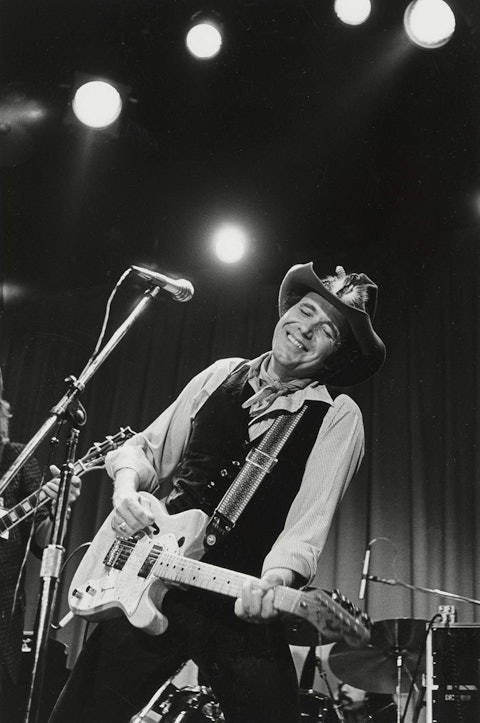
Bobby Bare playing a Fender Telecaster at the Exit/In in Nashville, 1980.
-
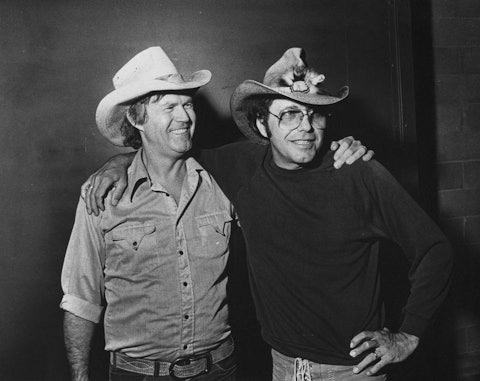
Billy Joe Shaver (denim shirt) and Bobby Bare.
-
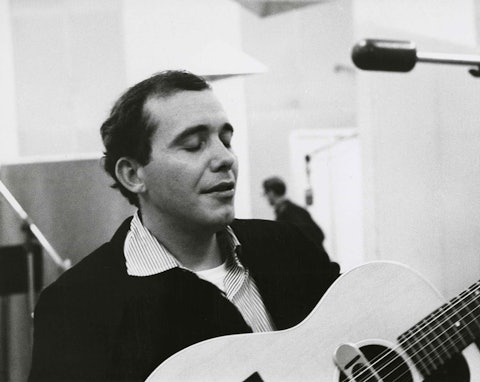
Bobby Bare in recording studio with a twelve-string acoustic guitar, 1960s.
-
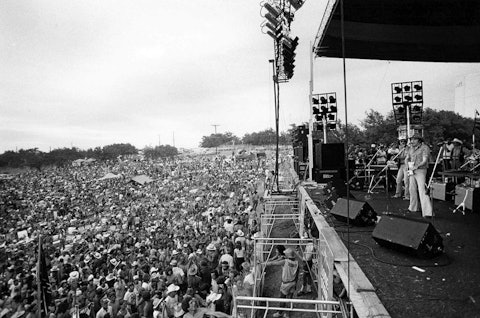
Bobby Bare, onstage at Willie Nelson’s Annual Fourth of July Picnic, 1979.
-
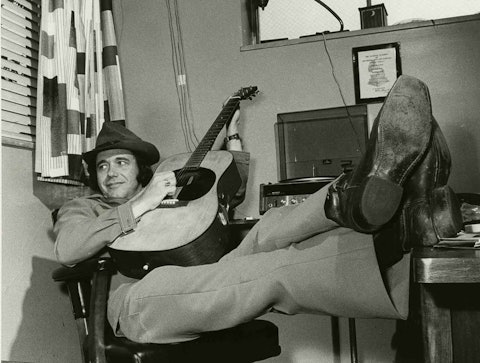
Bobby Bare in his Nashville office, 1973. Photo by Bill Goodman.
Bobby Bare and Friends
From 1983 to 1988, Bare hosted the TV show Bobby Bare and Friends on the Nashville Network. Thanks to Bare’s easygoing manner, the series captured American musicians and songwriters in an intimate way that few televised programs have. The show was based on what Bare called “guitar pulling”: “That’s where somebody plays and then someone can’t wait to pull the guitar away and sing his song.”
This series displayed his gift for gathering diverse poets, songwriters, musicians, and actors together to exchange ideas and swap tunes. Guests included cultural icons such as Chet Atkins, Johnny Cash, Emmylou Harris, B.B. King, Willie Nelson, John Prine, and Roger Miller. The interviews, often conducted casually around a recording console or a piano, resulted in frank conversations about the guests’ personal and artistic lives. Unique live performances featured interesting collaborations and gave viewers rare opportunities to witness songwriters perform their own compositions.
In 1973, Bobby Bare released the self-produced album Ride Me Down Easy. In so doing, he set an important precedent for other Nashville-based artists who were seeking greater creative input in producing their own albums.
Bobby Bare, Stylist
Throughout his career, Bare has worked in a variety of musical styles including rockabilly, country, and southern rock, and he has assisted many young songwriters early in their careers. Today, he retains a devoted following in the U.S. and overseas, and he continues to inspire friends and colleagues through his keen eye for song material, his interest in others’ careers, and his independent spirit.
–Dale Vinicur
Adapted from the Country Music Hall of Fame® and Museum’s Encyclopedia of Country Music, published by Oxford University Press.



